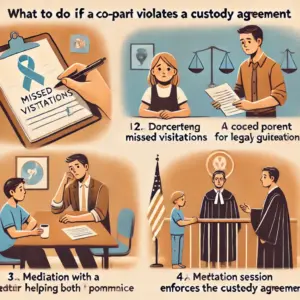You’re parenting together, but your co-parent isn’t following the custody agreement. This situation can be difficult and distressing. You need a clear plan. First, focus on the children. Their well-being comes first. Understand the details of your custody order. Each clause matters. Document everything. Keep records of missed visits or other breaches. This information is important if you seek legal assistance. You may need to contact a family lawyer. They can guide you on possible next steps. Don’t hesitate to seek mediation. It can help both parties communicate effectively. If necessary, approach the court. They can enforce the agreement. Finally, find support. Family, friends, or support groups can help you handle this situation. This process might seem overwhelming, but taking these steps can make a difference. For more information, visit our website. Remember, you’re not alone in this. Proper action and support can help you protect your children’s interests.
Understanding Your Custody Agreement
It’s crucial to thoroughly review your custody agreement. Know the specific terms and conditions. This understanding helps identify breaches. If necessary, consult a lawyer to clarify any uncertainties. A detailed grasp of the agreement empowers you. You can then better communicate your position to your co-parent. If you don’t have a copy, request one from the court.
Documenting Violations
Maintain thorough records of each violation. Note dates, times, and incidents in a dedicated notebook or digital file. Save any relevant communications, such as emails or texts. Clear records support your case if legal action becomes necessary. Documentation serves as evidence, strengthening your position and ensuring you stay organized.
Seeking Legal Advice
Consulting a family lawyer can be beneficial. They provide clarity on legal options. Lawyers help you navigate complex legal processes. They can suggest mediation, court intervention, or other suitable actions. For legal resources, visit LawHelp.org for guidance. A lawyer can provide emotional distance, helping you focus on practical steps.
Mediation as an Option
Mediation can resolve disagreements without escalation. It encourages constructive dialogue. A neutral mediator assists both parties in reaching an agreement. Mediation focuses on the children’s best interests, promoting cooperation and reducing conflict. It’s often less stressful and faster than court intervention.
Navigating Court Intervention
If all else fails, court intervention might be necessary. Courts enforce custody agreements and penalize non-compliance. Understand that this step can be lengthy. Prepare for the process by organizing all documentation. For more information on court processes, visit the United States Courts’ website. Enforcing the agreement legally ensures children’s stable environment.
Support Systems
Your emotional well-being is important. Seek support from family, friends, or support groups. Being surrounded by those who understand can alleviate stress. They provide comfort, encouragement, and practical advice. Joining a support group offers a sense of community, reminding you that others face similar challenges.
Comparison Table: Mediation vs. Court
| Aspect | Mediation | Court Intervention |
| Cost | Generally lower | Can be expensive |
| Time | Usually quicker | Can be lengthy |
| Stress Level | Less stressful | More stressful |
| Outcome | Mutually agreed | Legally enforced |
Moving Forward
Addressing custody violations is challenging but essential. Ensuring compliance protects your children. By understanding your rights and options, you can approach the situation calmly. Take proactive steps. This includes documenting violations, seeking professional help, and considering mediation or court intervention. Remember, finding effective resolutions benefits everyone involved, especially your children.


